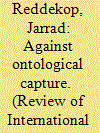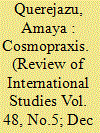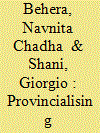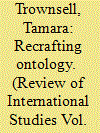|
|
|
Sort Order |
|
|
|
Items / Page
|
|
|
|
|
|
|
| Srl | Item |
| 1 |
ID:
187533


|
|
|
|
|
| Summary/Abstract |
This article offers an experiment in theorising within or across a ‘space’ of ontological disagreement – which, as numerous authors have contended, characterises much that is at stake in relations between states and Indigenous peoples in the Americas. Such ontological disagreements, I argue, contain radical potential for disrupting globally dominant and anthropocentric patterns of thinking and relating, and for generating alternatives. I substantiate this point with reference to the relational ontologies informing different Indigenous ways of analysing and practicing existence. Drawing on Amazonian Kichwa thinking and Anishinaabe accounts of treaties, I show how these relational ontologies recast the problem of how it is possible to relate with difference, in such a way as to fold an inter-human ‘international’ into a continuum of relations that include human-nonhuman ones. Distinct normative horizons emerge. I argue that non-Indigenous people can draw a range of provocations here concerning our constitution as selves and the political space in which we understand ourselves to possibly participate. I also claim, however, that this more transformative potential is predominantly squandered through processes of what I call ontological capture, which troublingly re-entrench dominant construals of reality and forestall a more radical questioning and re-patterning of accompanying lifeways.
|
|
|
|
|
|
|
|
|
|
|
|
|
|
|
|
| 2 |
ID:
187534


|
|
|
|
|
| Summary/Abstract |
Bringing ontological questions back into IR has been key to opening discussions about plurality and difference in terms of the coexistence of related and plural worlds and realities, for example through notions such as relationality and pluriversality. The problem is that in trying to develop relational approaches as an alternative to the ‘Western/modern’ – atomistic – ontology, relationality, relations, and their meanings can become fixed, translating them into ‘things’. The article maintains that cosmopraxis – as a complex pluriversal, multidimensional set of experiences – not only illustrates how relations relate without fixing their meaning, but also provides us with relevant insights to contribute to think of a pluriversal and more plural IR.
|
|
|
|
|
|
|
|
|
|
|
|
|
|
|
|
| 3 |
ID:
187529


|
|
|
|
|
| Summary/Abstract |
Both relationality and separateness are aspects of our everyday lives. How we engage these phenomena hinges on the particular existential assumptions that we take for granted. Within the discipline of International Relations (IR), both relationality and separateness have informed how global politics is studied and practiced. How states and their relations are conceived has, for instance, varied by the distinct degrees of privilege given to separation and interconnection: from notions of completely autonomous units like billiard balls to always emergent phenomena co-constituted through relations. The plurality of trajectories that inform this Special Issue illustrate how much broader the spectrum of relational engagement can be when we are cognisant of the impact of these existential assumptions on forms of life, knowing, and knowledge production in International Relations. By highlighting a spectrum of relational engagement, we raise important questions about the way the various knowledge frames in IR are acknowledged, legitimised, limited, and reproduced.
|
|
|
|
|
|
|
|
|
|
|
|
|
|
|
|
| 4 |
ID:
187532


|
|
|
|
|
| Summary/Abstract |
This article will attempt to ‘provincialise’ (Chakrabarty, 2000) the ‘secular cosmology’ of International Relations (IR) through an examination of the relational cosmology of dharma. We argue that IR is grounded in ‘secularised’ Judaeo-Christian assumptions concerning time, relations between self and other, order, and the sovereign state that set the epistemic limits of the discipline. These assumptions will be ‘provincialised’ through an engagement with dharma based on a reading of The Mahābharāta, one of the oldest recorded texts in the world. We argue that the concept of dharma offers a mode of understanding the multidimensionality of human existence without negating any of its varied, contradictory expressions. By deconstructing notions of self and other, dharma illustrates how all beings are related to one another in a moral, social, and cosmic order premised on human agency, which flows from ‘inside-out’ rather than ‘outside-in’ and that is governed by a heterogenous understanding of time. This order places limits on the state's exercise of power in a given territory by making the state responsible for creating social conditions that would enable all beings to realise their potential, thus qualifying the principle of state sovereignty that remains the foundation of the ‘secular cosmology of IR’.
|
|
|
|
|
|
|
|
|
|
|
|
|
|
|
|
| 5 |
ID:
187530


|
|
|
|
|
| Summary/Abstract |
A pluriversal encounter that includes interlocutors from other ways of knowing and being requires recrafting how we commonly approach ontology in IR. Our shared ontological register only acknowledges separation as the fundamental existential assumption, and not all lifeways depart from this assumption. The article prods us to move beyond considering ontology as the study of being, a more substantialist reading, to include other fundamental existential commitments so that we can address how distinct presuppositions shape and are shaped by how we perceive and engage existence. With this reorientation, the article first establishes how even relational approaches in the discipline, including variations of constructivism, poststructuralism, and new materialism privilege separation as the primordial condition of existence to the exclusion of any other option. A conceptual toolset is then elaborated to examine how a singular commitment to separation constitutes an ontological parochialism that enforces reductionism, exclusion, and domination towards lifeways that embrace the interconnection as fundamental existential commitment. Even though more effective engagement across pluriversal worlds would be crucial for developing more complex tools for confronting the current planetary crisis, the discipline's reductionist concept of ontology itself keeps us quite far from effectively being able to engage in such an exchange.
|
|
|
|
|
|
|
|
|
|
|
|
|
|
|
|
| 6 |
ID:
187535


|
|
|
|
|
| Summary/Abstract |
Ontological parochialism persists in International Relations (IR) scholarship among gestures towards relational ontological reinvention. Meanwhile, the inter-polity relations of many Indigenous peoples pre-date contemporary IR and tend to be substantively relational. This situation invites rethinking of IR's understandings of political order and inter-polity relations. We take up this task by laying out necessary methodological innovations to engage with Aboriginal Australia and then showing how conventional and much recent heterodox IR seek to create forms of ‘escape’ from lived political relations by asserting the powerful yet problematic social science mechanism of observer's distance. This demonstrates a need to take Aboriginal Australia as a system on its own terms to speak back to IR. We next explain how Aboriginal Australian people produce political order on the Australian continent through a ‘relational-ecological’ disposition that contrasts with IR's predominant ‘survivalist’ disposition. The accompanying capacity to manage survivalism through relationalism provides an avenue for engaging with and recasting some of mainstream IR's survivalist assumptions, including by considering an Aboriginal approach to multipolarity, without attempting ‘pure escape’ through alternative ontologies. We thus argue that while it is necessary to critique and recast dominant IR, doing so requires putting dominant IR and Indigenous understandings into relational exchange.
|
|
|
|
|
|
|
|
|
|
|
|
|
|
|
|
| 7 |
ID:
187531


|
|
|
|
|
| Summary/Abstract |
There is a multifaceted relational revolution afoot in International Relations (IR) and in the social sciences more widely. This article suggests, via engagement with varied forms of relational thought and practice in IR, but in particular via engagement with ‘relational cosmology’ associated with the ‘natural’ as well as the ‘social’ sciences, that there are important reasons for relational thought and practice in IR and around it to be more attentive to dialogues on relationality across natural and social sciences. If relational thought in IR has challenged the colonial and bifurcated ontologies of the field, relational cosmology too assists in shifting ‘modern’ understandings of science and the cosmos by facilitating engagement with situated knowledges and deep-going relationalities across ‘nature’ and ‘society’, ‘human’ and ‘non-human’ communities. Relational cosmology may be productive in joining, and perhaps even in facilitating, conversations across multiple relationalities emerging from different parts of the world and in different fields of inquiry, and yet – reflecting its relational and pluriversal orientations – it is not proposed here as a new ‘meta-‘ or ‘grand-’ narrative for relational theorising or IR.
|
|
|
|
|
|
|
|
|
|
|
|
|
|
|
|
| 8 |
ID:
187536


|
|
|
|
|
| Summary/Abstract |
The literature on International Relations theory has yet to align relational theory with role theory, despite the fact that these two theories share so much epistemological common ground. This article uses role theory to bridge the gap between the Confucian and Western conceptions of relationality, whose practitioners regard each other as strangers. With the support of role theory, the comparative analysis of relationality in this article has mainly focused on two different types of relations: prior rule-based relations and improvised relations. The differences in the cultural preparation for these two relations partially explain the plurality of the relational universe and the perception of stranger. Role theory is one way to reconnect the seemingly irreconcilable relational universes. To illustrate the value of a composite agenda of relational theory and role theory, the article will use Kim Jong-un of North Korea as its case. Confucian relations propose that, for all nations, the necessity of having a certain role relation is a more important agenda than insisting on exactly what role to take.
|
|
|
|
|
|
|
|
|
|
|
|
|
|
|
|
|
|
|
|
|